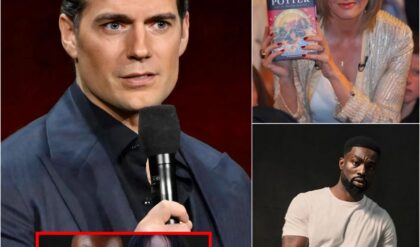London’s West End is abuzz with a theatrical experiment that has divided audiences and sparked intense debate: a bold new production of Andrew Lloyd Webber and Tim Rice’s Evita, starring Rachel Zegler, features the actress stepping off the stage to perform the iconic “Don’t Cry for Me Argentina” from the London Palladium’s exterior balcony—free for passersby, while paying ticket holders watch via livestream. Since previews began on June 14, 2025, this innovative staging by director Jamie Lloyd has drawn crowds of hundreds nightly, turned the production into a viral sensation, and ignited a firestorm of reactions. From praise for making theater accessible to outrage over the perceived slight to paying audiences, the revival has become the talk of the town. This article explores the unfolding drama, the context behind the decision, and the polarizing impact on London’s cultural scene.

The Incident: A Song Moves Outdoors
The controversy centers on a pivotal moment in Evita, which traces the rise and fall of Eva Perón, Argentina’s beloved yet controversial First Lady. Midway through the show, Zegler, in her West End debut, leaves the stage to sing “Don’t Cry for Me Argentina” from the Palladium’s balcony overlooking Argyll Street. The performance, broadcast live to the 2,286-seat auditorium via video screens, transforms the song into a public spectacle, with crowds gathering outside around 9 p.m. each night. This move, orchestrated by Lloyd, echoes his previous experiments—sending characters onto the street in Sunset Boulevard and onto the roof in Romeo and Juliet—but has taken the concept to a new level with Zegler’s star power.
The decision was unveiled during the first preview on June 14, with Zegler’s performance drawing a rapturous standing ovation inside and a spontaneous cheer from the street below. Photos and videos of the 24-year-old actress, adorned in a blonde wig and white gown, belting the anthem to a mix of theater fans and unsuspecting pedestrians have flooded social media, amassing millions of views. Yet, the innovation has not been universally welcomed. Paying audience members, who shelled out up to £250 ($336) per ticket, have expressed frustration at missing the live moment, sparking a divide that has only grown as the run continues through September 6.
The Viral Divide: Praise and Protest
The internet has become a battleground for opinions. Posts on platforms like X and TikTok celebrate the accessibility of the performance, with some calling it a “masterstroke” that brings culture to the masses. One observer noted, “It’s amazing to see Rachel Zegler singing to everyone, not just the elite with deep pockets.” The gesture aligns with Lloyd’s outreach efforts, including 5,000 £25 tickets for under-30s, key workers, and benefit recipients, reinforcing a mission to democratize theater.
However, the backlash has been equally fierce. Disgruntled ticketholders have taken to social media to vent, with comments like “I paid £350 for two tickets to watch a screen while strangers get the real thing for free” reflecting a sense of betrayal. Some argue the experience loses its intimacy, a core allure of live theater. The contrast between the outdoor free show and the indoor livestream has fueled accusations of gimmickry, with critics questioning whether the staging prioritizes viral buzz over artistic integrity.
The production’s timing during a UK heatwave has added another layer of contention. Reports of audience members falling ill from standing in the sun for hours to catch Zegler’s performance led to paramedic calls on June 20, with some blaming the “dangerous” conditions. This has intensified the debate, with some defending Zegler’s safety and others decrying the lack of better crowd management.
The Context: Zegler’s Journey and Lloyd’s Vision
Rachel Zegler’s casting as Eva Perón has been a focal point since the announcement in March 2025. The Golden Globe winner, known for West Side Story and the divisive Snow White remake, brings a fresh perspective to a role previously embodied by icons like Elaine Paige, Patti LuPone, and Madonna. Zegler’s personal connection to the musical—singing “Don’t Cry for Me Argentina” with her father as a child—adds authenticity, and her vocal clarity has been widely praised in early reviews. Yet, her recent controversies, including backlash over Snow White comments and pro-Palestine activism, have made her a polarizing figure, amplifying scrutiny of this production.
Jamie Lloyd, a director celebrated for his minimalist yet radical reinterpretations, drives the creative vision. His Olivier- and Tony-winning Sunset Boulevard and the Tom Holland-led Romeo and Juliet showcased his flair for multimedia staging, and Evita continues this trend. Lloyd’s decision to move the balcony scene outdoors reflects Eva Perón’s historical connection to the Argentine masses, turning the song into a public address. Andrew Lloyd Webber has endorsed the choice, calling it “an extraordinary moment” that honors the character’s populist appeal. The production, running until September 6 with a press night on July 1, also features Diego Andres Rodriguez as Che and James Olivas as Juan Perón, but Zegler’s performance has dominated the narrative.
The Artistic Debate: Innovation or Insult?
The staging decision ties into Evita’s themes of spectacle and political theater, with the balcony evoking Eva Perón’s real-life addresses from the Casa Rosada. Supporters argue it reimagines the song’s emotional weight, transforming it from a private confession to a public declaration, as Chris Peterson of OnStage Blog noted: “It reframes everything we think we know about Eva Perón.” The free performance also aligns with Lloyd’s outreach, potentially drawing new audiences to theater.
Critics, however, see it as a gimmick that undermines the paying audience. The Guardian highlighted the irony of ticketholders watching a livestream while passersby enjoy the live event, questioning its theatrical value. Some compare it to Ivo van Hove’s Opening Night, where Sheridan Smith performed outside, but the Evita move’s scale—nightly and with a global star—sets it apart. The addition of trigger warnings for loud music and sudden noises has further fueled ridicule, with figures like Toby Young calling it “beyond parody,” adding to the production’s contentious reception.
The Bigger Picture: Theater in the Digital Age
This split reflects broader tensions in modern theater. The industry grapples with accessibility—high ticket prices often exclude younger or less affluent audiences—while facing pressure to adapt to digital culture. Lloyd’s use of livestreaming and street performances taps into this shift, mirroring how social media drives attendance, as seen with the £9 million advance box office. Yet, it risks alienating traditional theatergoers who value the live, shared experience, a sentiment echoed in posts lamenting the loss of intimacy.
The controversy also highlights Zegler’s evolving career. After Snow White’s mixed reception and financial struggles, Evita offers redemption, with early buzz suggesting a Broadway transfer in 2027. Her balcony performances, drawing 600 to 1,000 people nightly, have boosted the show’s profile, but the health incidents raise questions about sustainability. Security concerns, given her past controversies, further complicate the narrative, though no incidents have been reported.
The Ripple Effect: Cultural and Commercial Impact
The production’s impact is undeniable. Box office figures remain strong, with daily adds of $200,000, though some online claims of empty seats have been debunked by official reports of healthy sales. The viral moment has increased visibility, with charities reporting a surge in arts-related donations, possibly inspired by the free access. However, the divide among audiences could affect long-term perception, with some vowing to avoid future Lloyd productions.
For Zegler, the role cements her as a leading lady, with talks of a Sound of Music stint in 2027. Lloyd’s reputation as a trailblazer grows, though the experiment’s success hinges on balancing innovation with audience satisfaction. The theater community watches closely, debating whether this marks a new era or a fleeting trend.
Conclusion: A Stage Divided
The new Evita production, with Rachel Zegler serenading London for free, has split opinions in a way few shows have. It’s a bold reimagining that celebrates accessibility and artistry, yet it risks alienating those who fund the craft. The silence that follows each balcony performance—broken by cheers from the street and murmurs inside—mirrors the broader cultural clash between tradition and innovation.
As the run progresses, the true measure of this experiment will emerge. For now, Zegler’s voice echoes beyond the Palladium, a symbol of theater’s evolving identity in 2025. Whether it unites or divides, the debate it has sparked ensures Evita will be remembered—not just for its music, but for the moment it took to the streets.





